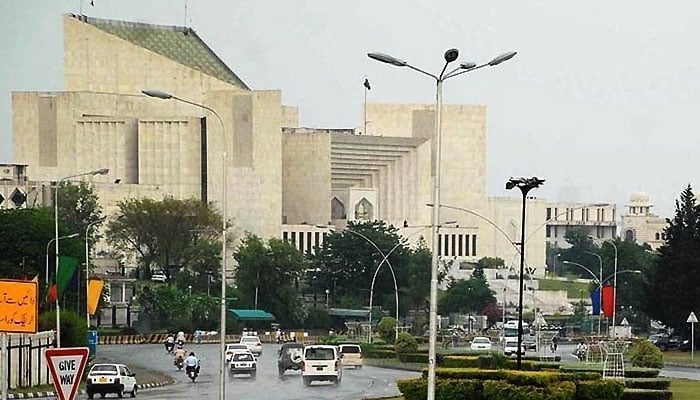Sacked employees act can’t be restored: What relief sacked employees can be given, SC to govt
ISLAMABAD: The Supreme Court on Monday observed that the Sacked Employees (Reinstatement) Act 2010 was struck down and could not be restored and the government should determine what relief could be given to sacked employees.
A five-member bench of the apex court headed by Justice Umer Ata Bandial heard the review petitions filed by the government and the sacked employees against the court judgment striking down the act.
The court directed Attorney General Khalid Javed to give proposals on what relief the government could give to the employees who worked for ten years in different government departments. Justice Sajjad Ali Shah observed that the act which was struck down by the court could not be restored and the government should determine what relief could be given to the employees. “The court cannot reverse its decision,” he remarked.
Justice Umer Ata Bandial questioned that without any procedure, how recruitments and reinstatements could be made? The judge recalled that in the past, a person had given his land for constructing a school on the condition of his recruitment while the Supreme Court had struck down the decision of the appointment of that person against his land.
Khalid Javed submitted that the court had constituted a committee in the matter of recruitments of employees of the Federal Investigation Agency (FIA). Justice Mansoor Ali Shah observed that with the reinstatement of the employees, 15,000 vacancies came to an end but what will be the fate of those whose rights had been infringed and ignored in these ten years. “It was also unclear whether the institutions needed these people or not,” Justice Mansoor Ali Shah observed, adding that it will also be looked into whether the restored employees were a burden on these institutions or not.
Justice Sajjad Ali Shah observed that thousands of employees were sacked on the basis of corruption, absence from duties and misconduct. The employees, sacked on charges of corruption and theft, could not be reinstated,” Justice Sajjad Ali Shah remarked. Justice Umer Ata Bandial observed that the court can only interpret the Constitution and law.
“It was the job of the government to categorize the employees,” Justice Bandial remarked, adding that they are not saying that the government cannot make recruitments, it can but in accordance with the law and procedure. Justice Bandial observed that there should be a proper procedure and merit for the recruitments. “We have taken oath for the protection of the Constitution,” he remarked.
Earlier, the AG while commencing his arguments told the court that he has already submitted his written formulations, adding that the employees were sacked in view of a letter of the Establishment Division dated November 7, 1996 and the act was introduced for their reinstatement. He submitted that in lieu of the decision of the apex court, some 16,000 employees of 16 institutions were affected while according to the Establishment Division, some 5,000 employees were affected, adding that between 1993 and 1996, these employees were recruited while up to 1999, these employees were sacked during different times.
Justice Bandial observed that the court had given its decision after hearing the AG office, adding that the Constitution gives powers to the Supreme Court to provide justice.
“These employees were not recruited through any procedure and the apex court had examined the procedure in its decision as well,” Justice Bandial remarked, adding that at least there should have been some procedure for employment on government posts.
Justice Mansoor Ali Shah observed that all the employees were not sacked through a letter and an executive order, adding that it was true that the employees had no role in unconstitutional legislation but the reinstatement law cannot be made again as the decision of the court has come.
The attorney general submitted that the parliament and government are defending the law through him. Justice Qazi Muhammad Amin Ahmed asked the AG if there could be any governance system above the Constitution, adding that initially, the government had opposed the reinstatement of the employees while in the review, it wants to restore the sacked employees.
The AG replied that three daughters of one of the sacked employees have been struck off from school for not paying the fees.
Justice Umer Ata Bandial observed that working for long term, the employees must have got experience. The AG replied that the court’s decision does not apply to the employees who were reinstated through an ordinance, adding that the life of an ordinance is just 240 days.
The AG recalled that on the last hearing, it was said that the government is running on ordinances. However, he submitted that the ordinances, which were promulgated in 2010, never came before in such volumes.
On this, Justice Mansoor Ali Shah asked the attorney general if an ordinance does not get authentication, what will be the status of the steps taken through it? The AG replied that relief can only be granted during the life of the ordinance but not after its expiry. Later, the court adjourned the hearing for today (Tuesday) after directing the AG that the government should determine what relief it could give to the sacked employees.
-
 Why ‘X’ Is Down? Thousands Report Twitter Outage: Here’s What You Can Do
Why ‘X’ Is Down? Thousands Report Twitter Outage: Here’s What You Can Do -
 Florida Man Held After Alleged Nail-scattering On Busy Intersections
Florida Man Held After Alleged Nail-scattering On Busy Intersections -
 Valeria Nicov: Sean Penn's Athletic Girlfriend Raises Eyebrows With Latest Photos
Valeria Nicov: Sean Penn's Athletic Girlfriend Raises Eyebrows With Latest Photos -
 Sharon Stone Lashes Out At Fellow Award Show Attendees After Stealing Accusations
Sharon Stone Lashes Out At Fellow Award Show Attendees After Stealing Accusations -
 Gwyneth Paltrow Reveals Real Reason She Said Yes To 'Marty Supreme'
Gwyneth Paltrow Reveals Real Reason She Said Yes To 'Marty Supreme' -
 King Charles Says He And Queen Camilla Stand With People Of Ukraine
King Charles Says He And Queen Camilla Stand With People Of Ukraine -
 Ben Affleck Argues In Favour Of His Shirtless Scene In 'The Rip'
Ben Affleck Argues In Favour Of His Shirtless Scene In 'The Rip' -
 Mississippi Postal Worker Arrested After Complaints Of Marijuana Odour In Letters
Mississippi Postal Worker Arrested After Complaints Of Marijuana Odour In Letters -
 Canada, China Lock Initial Trade Deal On ‘EV,Canola’ To Strengthen Ties: What To Expect Next?
Canada, China Lock Initial Trade Deal On ‘EV,Canola’ To Strengthen Ties: What To Expect Next? -
 Melissa Leo On Euphoria Of Winning An Oscar Vs It's Impact On Career
Melissa Leo On Euphoria Of Winning An Oscar Vs It's Impact On Career -
 Meghan Markle, Prince Harry Express 'hope' In Latest Major Statement
Meghan Markle, Prince Harry Express 'hope' In Latest Major Statement -
 Sophie Turner Backs Archie Madekwe As BAFTA Announces Nominees
Sophie Turner Backs Archie Madekwe As BAFTA Announces Nominees -
 Jason Momoa Cherishes Hosting Ozzy Osbourne's Final Gig Ahead Of His Death
Jason Momoa Cherishes Hosting Ozzy Osbourne's Final Gig Ahead Of His Death -
 Real Reason Timothee Chalamet Thanked Kylie Jenner At Awards Revealed
Real Reason Timothee Chalamet Thanked Kylie Jenner At Awards Revealed -
 Will King Charles Attend Funeral Of Prince Philip's First Cousin, Princess Irene?
Will King Charles Attend Funeral Of Prince Philip's First Cousin, Princess Irene? -
 'Furious' Prince William Wants Andrew As Far Away As Possible
'Furious' Prince William Wants Andrew As Far Away As Possible




